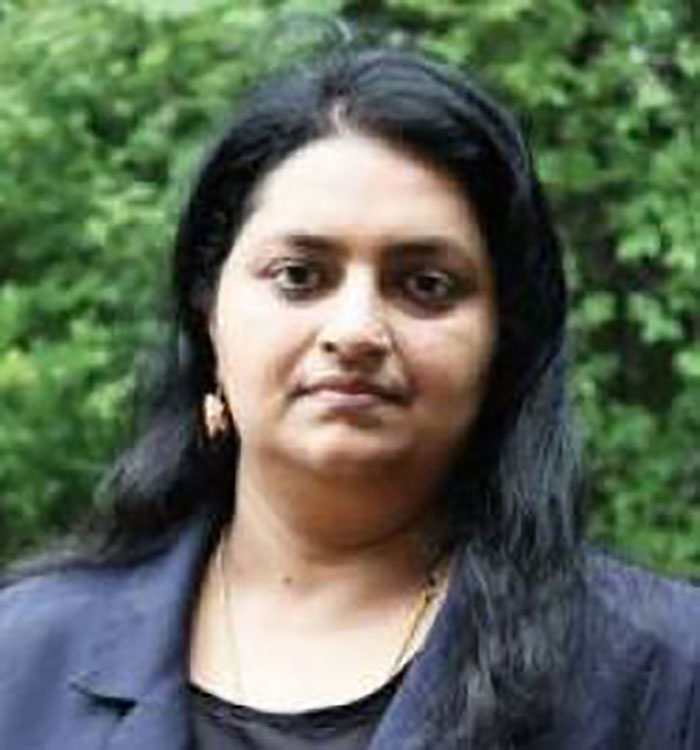More Specific Approach to CAR T Cell Therapy Shows Promise for B Cell Cancers
November 08, 2020
Investigational New Drug (IND) authorization is under way
Innovations in Cancer | Fall 2020
Researchers at University Hospitals Seidman Cancer Center are working to develop a more specific CAR T therapy for B cell cancers, such as chronic lymphocytic leukemia, non-Hodgkin lymphoma, multiple myeloma and acute lymphoblastic leukemia.
 Reshmi Parameswaran, PhD
Reshmi Parameswaran, PhDThe therapeutic tool under investigation targets three BAFF receptors on cells from these cancers – BAFF-R, BCMA, and TACI. Importantly, this new BAFF CAR T approach avoids early B cells while targeting more mature B cells that express one of these three antigens, something that promises fewer side effects for patients when implemented clinically.
“Most of the B cell cancers express these receptors, as well as autoimmune diseases like lupus, rheumatoid arthritis, Sjogren’s syndrome,” says Reshmi Parameswaran, PhD, a scientist in the Division of Hematology and Oncology at UH Seidman Cancer Center and an Assistant Professor of Medicine at Case Western Reserve University School of Medicine. “We developed a BAFF CAR T that can target these receptors on B cell cancers and autoimmune B cells. BAFF CAR T- cells will bind to BAFF receptors on these cells and it will activate T cells to specifically kill them, without affecting other normal cells.”
Dr. Parameswaran’s lab was the first to discover that acute lymphocytic leukemia (ALL) cells express BAFF-R. It is also to her knowledge the only lab taking this particular approach to BAFF.
“I discovered the presence of BAFF-R on ALL cells, which are early B cells,” she says. “Normally early B cells do not express this receptor, but we found that once they become malignant, they switch on BAFF-R expression.”
CAR T therapies currently approved by the U.S. Food and Drug Administration (FDA) target CD19 on cancer cells, but in the process, destroy many healthy cells.
“CD19 is a pan-B-cell marker, meaning it is expressed in all B cells, from early to very late stages,” Dr. Parameswaran says. “CD19 CAR T cells will kill all B cells in the patient, normal B cells included. Despite promising efficacy, CD19 CAR T therapy has problems of healthy B cell depletion. While CD19 is expressed on all B cells, BAFF-R is expressed only on mature B cells, making it more specific antigen for targeting and narrowing down the side effects caused by off targeting.”
So far, the initial work of expanding BAFF CAR T-cells is well under way. It is being done on site at the Wesley Center for Immunotherapy at UH Seidman Cancer Center, a state-of-the-art cell manufacturing facility shared by University Hospitals and Case Western Reserve University. This facility is capable of generating CAR T-cells in an expedited fashion and at reduced cost. Dr. Parameswaran and her team have also completed in vitro efficacy and pre-clinical in vivo efficacy studies using mouse xenograft models of ALL and mantle cell lymphoma.
“We have done in vitro testing of efficacy and found that it kills ALL cells and kills mantle cell lymphoma cells,” she says. “We did also pre-clinical in vivo studies using immunocompromised mice. This we did for ALL and mantle cell lymphoma. Both models worked really well, and the BAFF CAR T-cells were very efficient in killing these cells in vivo.”
Because of this early success, Dr. Parameswaran says, Case Western Reserve University has entered into a formal collaboration agreement with pharmaceutical company Luminary Therapeutics, which includes an option for Luminary to exclusively license a novel BAFF target for use in CAR T constructs. Work is also ongoing on an application for an Investigational New Drug (IND) authorization by the FDA. Although the specific timeline is still unclear, the goal is to offer a BAFF CAR T clinical trial for patients with B cell cancers and autoimmune diseases in the not-so-distant future.
Dr. Parameswaran says she also envisions a possible role for BAFF CAR T therapy for patients who’ve already undergone therapy with CAR T-cells targeting CD19.
“CD19 CAR T therapy patients, once they relapse, they cannot be treated with CD19 CAR T cells anymore,” she says. “They do not have CD19 on the cell surface. But those patients are reported to be positive for BAFF receptors, which is a good thing. Even patients who are relapsing and who are not responding to CD19 CAR T are still expressing BAFF receptors, so it could be a salvage therapy for them.”
For more information about this project, please email Reshmi Parameswaran, PhD at rxp278@case.edu.


